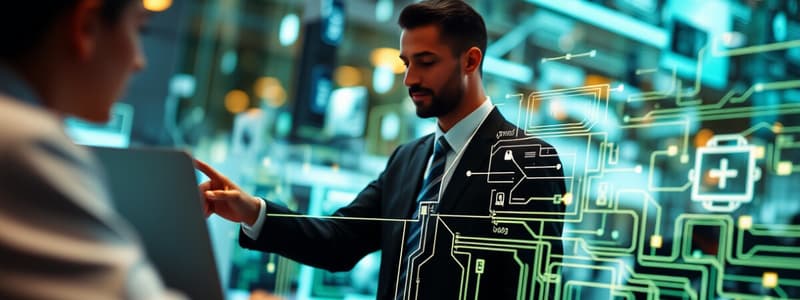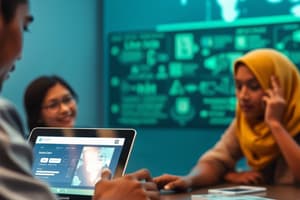Podcast
Questions and Answers
What is the primary function of system software?
What is the primary function of system software?
- To play audio and video files
- To manage hardware and provide a platform for application software (correct)
- To assist users in creating documents
- To facilitate communication through messaging and video calls
Which of the following is an example of application software?
Which of the following is an example of application software?
- Microsoft Windows
- Device drivers
- Disk cleanup utility
- Adobe Photoshop (correct)
Which category does VLC Media Player belong to?
Which category does VLC Media Player belong to?
- Graphics and Design Software
- Media Players (correct)
- Productivity Software
- Communication Software
What type of software would Microsoft Outlook be classified as?
What type of software would Microsoft Outlook be classified as?
Which of the following is NOT a function of utility programs?
Which of the following is NOT a function of utility programs?
What is the primary function of the Central Processing Unit (CPU) in a computer?
What is the primary function of the Central Processing Unit (CPU) in a computer?
Which component is responsible for converting electrical power from an outlet into usable power for the computer?
Which component is responsible for converting electrical power from an outlet into usable power for the computer?
Which type of storage drive uses spinning disks for data storage?
Which type of storage drive uses spinning disks for data storage?
What is the role of peripheral devices in a computer system?
What is the role of peripheral devices in a computer system?
Which generation of computers is identified with integrated circuits and microprocessors?
Which generation of computers is identified with integrated circuits and microprocessors?
What type of computer is primarily used for individual tasks and personal use?
What type of computer is primarily used for individual tasks and personal use?
What does RAM stand for and what is its primary use in a computer?
What does RAM stand for and what is its primary use in a computer?
Which of the following components handles the rendering of images, videos, and animations?
Which of the following components handles the rendering of images, videos, and animations?
What is the primary difference between Information Technology (IT) and Information and Communication Technology (ICT)?
What is the primary difference between Information Technology (IT) and Information and Communication Technology (ICT)?
Which area has been profoundly impacted by ICT through e-learning platforms?
Which area has been profoundly impacted by ICT through e-learning platforms?
In what way does ICT support scientific research?
In what way does ICT support scientific research?
How has ICT transformed the entertainment industry?
How has ICT transformed the entertainment industry?
What critical business function does ICT support that involves managing customer relationships?
What critical business function does ICT support that involves managing customer relationships?
What role does IT play in digital forensics?
What role does IT play in digital forensics?
Which of the following best describes the concept presented by Theodore Kacyznski regarding technology?
Which of the following best describes the concept presented by Theodore Kacyznski regarding technology?
What does the broad nature of ICT imply about its applications?
What does the broad nature of ICT imply about its applications?
Flashcards are hidden until you start studying
Study Notes
Module Goals
- Understand the role of information technology in solving real-world problems.
- Recognize the importance of information technology in daily life.
- Define information and communication technology (ICT) and its applications.
- Trace the evolution of various technologies over the years.
Information Technology (IT)
- Involves the use, creation, and management of computer systems, software, and networks.
- Facilitates data storage, processing, transmission, and retrieval.
Information and Communication Technology (ICT)
- Broader than IT, focusing more on communication technologies.
- Includes tools that enable communication and is an extension of IT.
- Transformed education through e-learning platforms, online courses, and digital libraries.
- Boosts scientific research by providing computational resources and data analysis tools.
- Revolutionized the entertainment industry in content creation, distribution, and consumption.
- Supports critical business functions such as ERP and CRM systems.
- Contributes to digital forensics for legal and criminal investigations.
Historical Development of Computing
- Pre-Modern Computing: Use of the abacus.
- First Generation Computers: ENIAC and UNIVAC.
- Second Generation Computers: Introduction of transistors and mainframes.
- Third Generation (1970s - Present): Use of integrated circuits and microprocessors, leading to personal computing and mobile devices.
Types of Computers
- Mainframes
- Servers
- Personal Computers (PC)
- Embedded Systems
- Supercomputers
Internal Components of a Computer
- Central Processing Unit (CPU): Executes instructions and performs calculations.
- Motherboard: Main circuit board connecting all internal components.
- Memory (RAM): Temporary storage for data being processed by the CPU.
- Storage Drives (HDD/SSD): Permanent data storage; HDD uses spinning disks, SSD uses flash memory.
- Power Supply Unit (PSU): Converts electrical power for internal components.
- Graphics Processing Unit (GPU): Renders images and videos, crucial for gaming and design.
Peripheral Devices
- Input Devices: Include keyboards, mice, and scanners for data input.
- Output Devices: Monitors, printers, and speakers display or output data.
- Storage Devices: External tools like hard drives and USBs for data storage.
- Network Devices: Modems and routers that connect computers to networks.
Computer Software
- Collection of data or instructions directing the computer's operation; intangible compared to hardware.
System Software
- Operating System (OS): Manages hardware and software resources (e.g., Windows, macOS).
- Device Drivers: Interface between OS and hardware components.
- Utility Programs: Perform maintenance tasks (e.g., virus scanning).
Application Software
- Productivity Software: Tools for document creation and management (e.g., Microsoft Office).
- Media Players: Software for audio and video playback (e.g., VLC).
- Web Browsers: Applications for internet navigation (e.g., Google Chrome).
- Graphics and Design Software: Tools for creating/editing visual media (e.g., Adobe Photoshop).
- Communication Software: Facilitate messaging and video conferencing (e.g., Zoom).
- Games and Entertainment Software: Applications designed for leisure and interactive experiences.
Studying That Suits You
Use AI to generate personalized quizzes and flashcards to suit your learning preferences.




